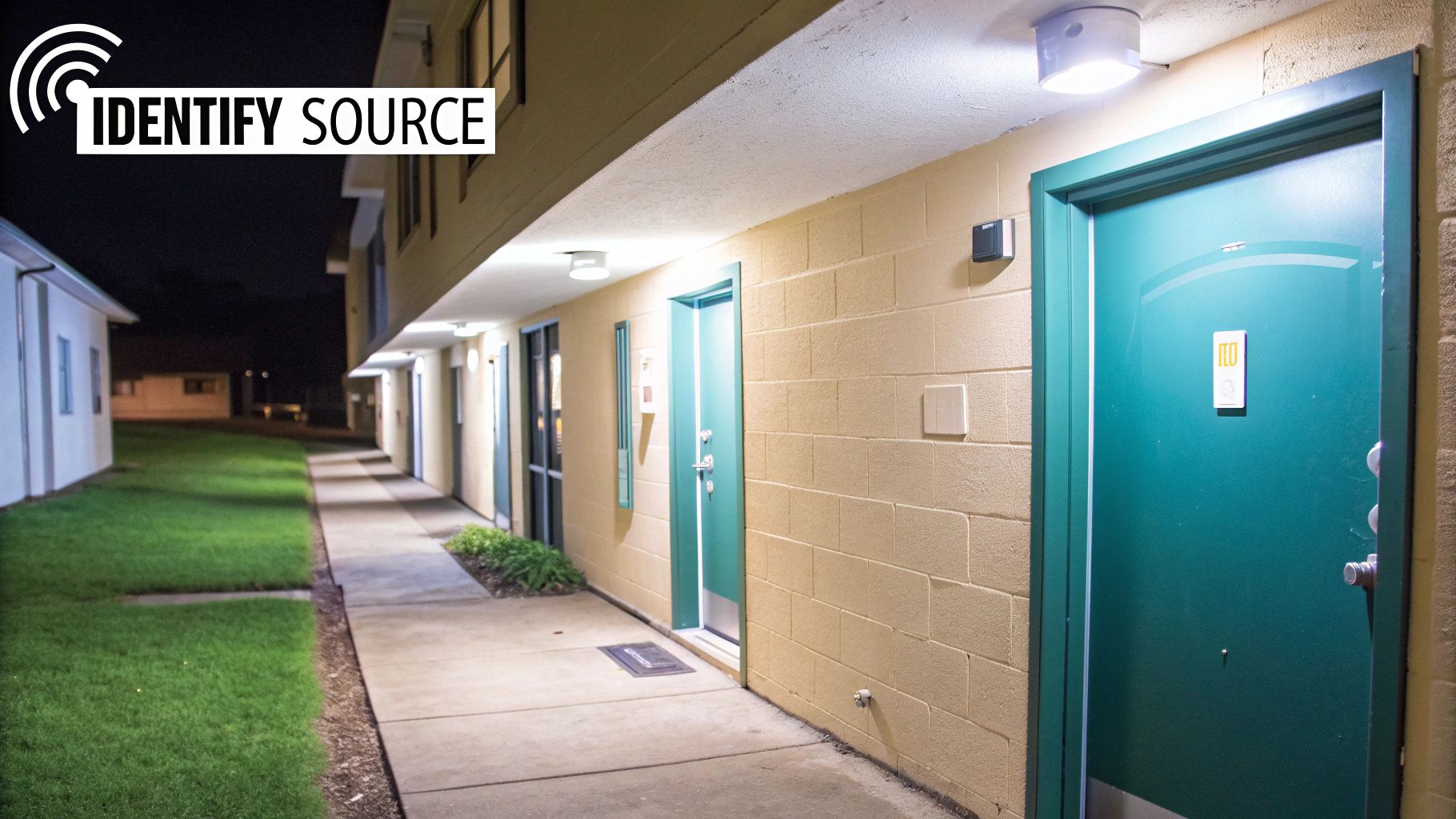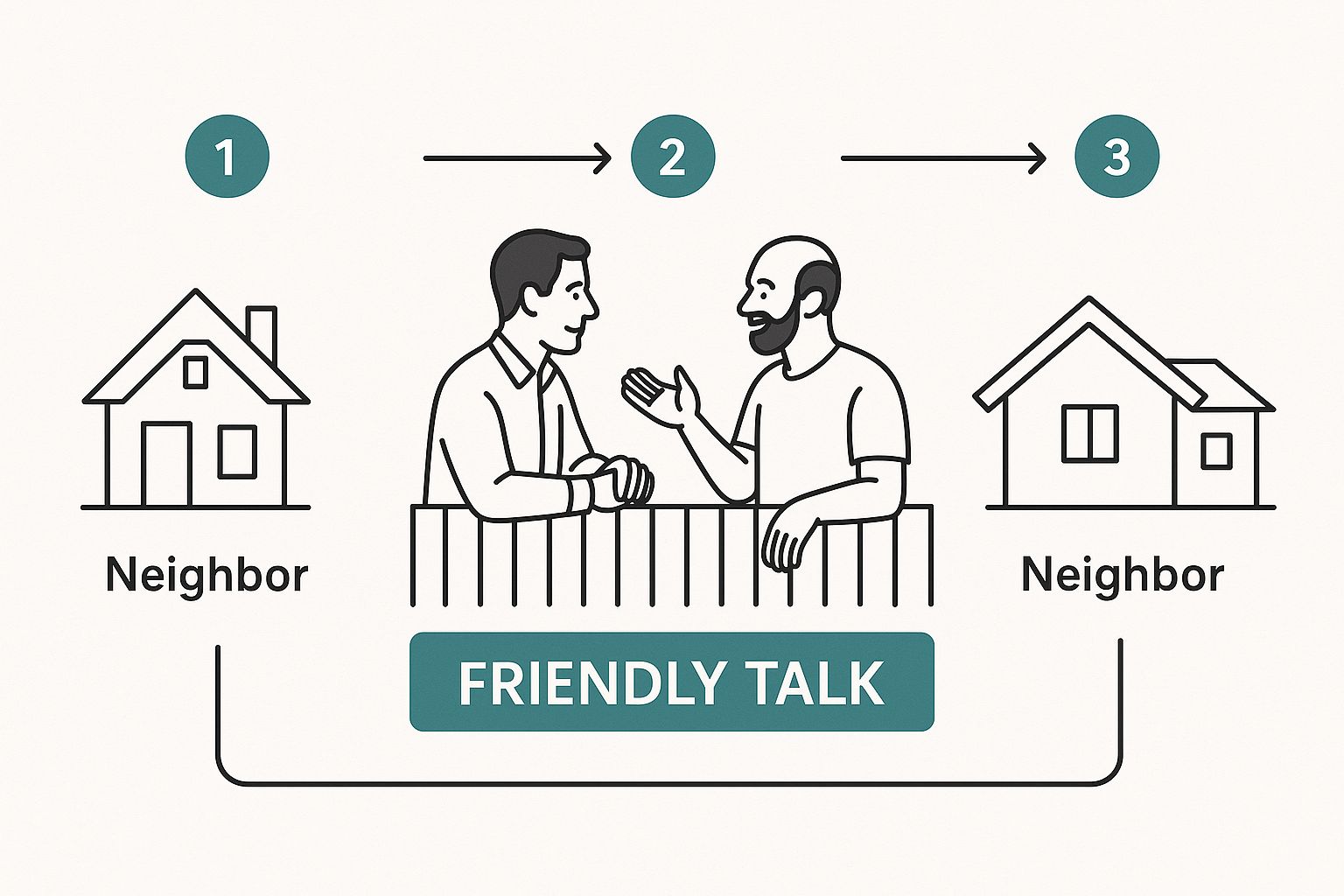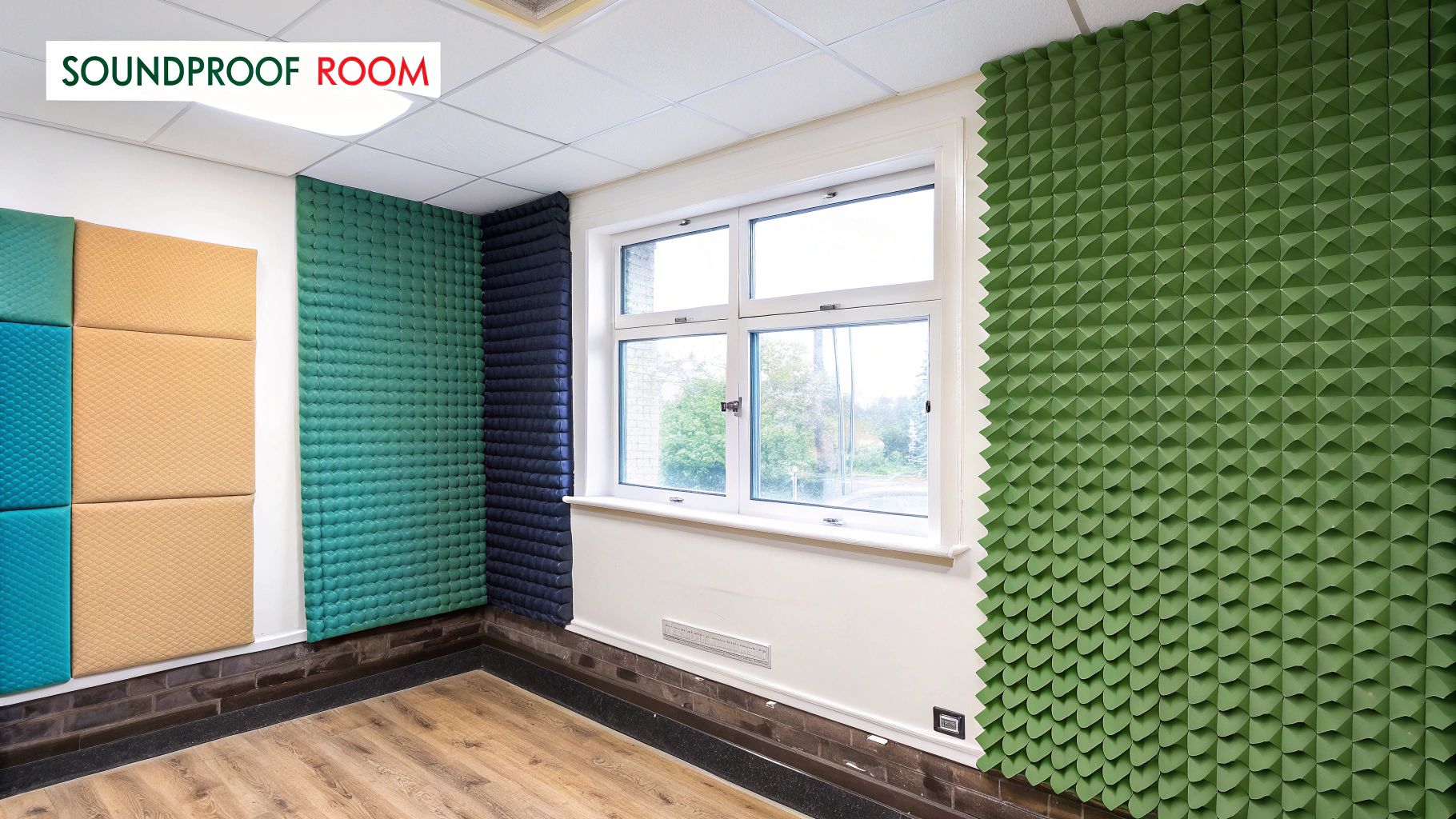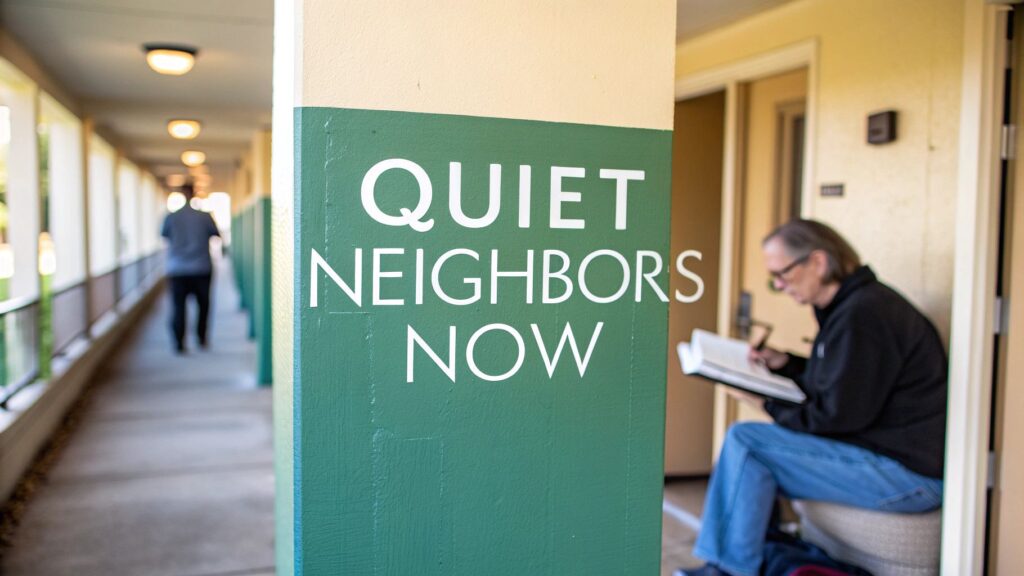Dealing with a noisy neighbor can be incredibly frustrating, but your first move shouldn't be an angry confrontation. It almost always starts with a simple conversation. My experience has shown that documenting the issue first and then approaching your neighbor with respect can solve the problem before anyone else needs to get involved.
Your First Moves for a Quieter Home

Constant, disruptive noise isn't just a minor annoyance; it chips away at your peace of mind. Before you let that frustration boil over, taking a calm, measured approach is your best bet for getting back to quiet. This isn't about picking a fight—it’s about finding common ground.
First, Figure Out What's Happening
Before you do anything, try to understand the noise itself. Is it a one-off graduation party, or is it a dog that barks nonstop every single afternoon? The context here is everything. A single loud night might just call for a bit of patience, but a consistent disturbance is a different story and needs to be addressed.
I always recommend keeping a simple log for a few days. Just jot down the date, time, and what kind of noise it was. This isn't for a lawsuit (not yet, anyway!), but to help you spot a pattern. It's incredibly useful when you decide to talk to your neighbor or, if it comes to it, building management.
To help you organize your thoughts, here's a quick reference for that first interaction.
Quick Guide to Your Initial Actions
| Action | Objective | Pro Tip |
|---|---|---|
| Observe & Log | Understand the noise pattern (when, what, how long). | A simple notebook or phone note is perfect. Be factual, not emotional. |
| Pick Your Moment | Find a calm, neutral time to talk—not at 3 AM. | A friendly hello in the hallway or by the mailboxes is low-pressure. |
| Use "I" Statements | Frame the issue from your perspective to avoid blame. | "I've been having trouble sleeping…" works better than "Your music is too loud!" |
| Suggest a Solution | Offer a simple, collaborative fix. | "Would it be possible to turn it down after 10 PM on weeknights?" |
This initial, friendly chat is often all it takes. The goal is to open a line of communication and turn a potential conflict into a simple conversation.
What You Can Do in Your Own Apartment
While it’s your neighbor’s job to manage their noise, you have some power to reclaim your quiet, too. A few simple tweaks can make a surprisingly big difference. You might want to look into things like DIY window soundproofing, which offers some great practical tips for muffling outside sounds.
Even small adjustments inside can help create a more peaceful space:
- Lay down thick rugs or carpets. They do a fantastic job of absorbing sound, especially footsteps from the apartment above you.
- Hang heavy curtains. These can help dampen noise coming from outside or even from an adjacent balcony.
- Rearrange your furniture. A big, heavy bookcase pushed against a shared wall adds mass and can really reduce sound transfer.
These little fixes, combined with good communication, create a powerful one-two punch against noise. Of course, making your apartment feel like home also involves managing costs. We've put together a guide on how to save on rent without compromising with some helpful ideas for our Cynthia Gardens residents.
Mastering the Art of Neighborly Communication
Talking to your neighbor is almost always the quickest way to solve a noise problem, but you have to handle it with a bit of finesse. The goal here isn't to win a fight; it's to find a way to coexist peacefully. Going in with some empathy and a clear head makes all the difference.
Timing is everything. Think about it—catching your neighbor on a calm Tuesday afternoon will go over much better than knocking on their door mid-party on a Saturday night. Find a neutral, relaxed moment. It sets the stage for a real conversation, not a confrontation.
Frame the Conversation Carefully
How you say something matters just as much as what you say. The biggest mistake you can make is to sound accusatory, which instantly puts people on the defensive. Instead, stick with "I" statements to explain how the noise affects you personally.
For example, instead of, "Your music is way too loud," try something like this: "Hi, I live next door, and I've been having trouble concentrating on my work in the afternoons. I was wondering if we could figure out a good solution."
Key Insight: Focus on the impact the noise has on you, not on your neighbor's actions. This simple shift changes the entire dynamic from a confrontation to a collaborative problem-solving session.
When you're trying to find common ground, it really helps to understand where they're coming from. Learning how to ask better questions can turn these tricky conversations into something far more constructive.
Scripts for Real-World Scenarios
It can be nerve-wracking, so having a few phrases ready can boost your confidence. Here are a couple of examples you can tweak for your specific situation here at Cynthia Gardens:
- For Late-Night Noise: "Hey, hope I'm not bothering you. I have to get up for work super early, and I was having a tough time sleeping last night. Would you mind keeping things a bit quieter after 11 PM?"
- For Persistent Daytime Noise: "Hi there! I'm your neighbor from 2B. I work from home a few days a week, and sometimes the noise from upstairs makes it tough to focus during my calls. Is there a time of day that might work better for louder activities?"
If talking face-to-face feels like too much, a friendly note is a great first step. Keep it brief, polite, and use that same "I" statement approach. A simple, handwritten note can feel much less confrontational and still get your point across.
Why You Need to Document Everything
If your friendly chats with your neighbor haven't quieted things down, it’s time to change gears. You need to move from talking to tracking. Honestly, a detailed log is the single most powerful tool you'll have in this situation. It’s what transforms your complaint from a subjective feeling—like "they're always loud"—into a factual, documented pattern of disturbances.
This record becomes your undeniable proof when you bring the issue to Cynthia Gardens management or, in more extreme cases, other authorities. Without it, you're stuck in a "he said, she said" scenario. A solid log gives you the credibility you need for your complaint to be taken seriously.
What Your Noise Log Must Include
To be effective, your documentation needs to be specific and consistent. Think of yourself as a quiet data collector. Each entry in your log should be a clear, concise snapshot of a specific incident.
For every time the noise becomes a problem, jot down these details:
- The Date: The day the noise happened.
- The Exact Time: Be sure to note when it started and when it stopped. This shows the duration, which can be very important.
- A Specific Description: Don't just write "loud music." Get descriptive. Was it "heavy, thumping bass that vibrated my floor"? Or maybe "non-stop, high-pitched dog barking for an hour"? The more detail, the better.
- The Impact on You: Briefly state how it affected you. For example, "I couldn't hear my TV," "it woke up my child," or "it made it impossible to focus while working from home."
This visual breaks down the typical escalation process, starting with a simple conversation before moving into more formal steps like documentation.

As you can see, a friendly chat is the right place to start. But having your documentation ready is the critical next phase if that conversation doesn’t lead to a resolution.
Gathering Supporting Evidence
Your written log is the foundation, but adding other forms of evidence can really strengthen your case. Short audio or video recordings from your smartphone can be incredibly compelling. Just capture a quick, clear clip of the noise as it sounds from inside your own apartment. This gives management objective proof of exactly what you're hearing.
A Word of Caution: Your goal is to document the noise bleeding into your apartment, not to secretly record your neighbors' private conversations. Never record people without their consent. It’s always a good idea to be aware of Florida's specific laws on recording.
It’s interesting to see how reluctant many people are to take this next step. A national survey revealed that only about 9% of people bothered by noise actually file a formal complaint. Unsurprisingly, city dwellers—like us here in Boca Raton—are far more likely to report issues, making up 65.7% of all noise complaints nationwide. You can read more details about community noise complaints and see how these trends break down.
Taking It to the Next Level: Involving the Landlord
So, you’ve tried the friendly approach, and the noise is still happening. It’s frustrating, I know. But now it’s time to shift gears and bring in Cynthia Gardens management. When you do this, you’re moving from a neighborly request to a formal complaint. You're officially putting the responsibility where it belongs: on the landlord. They have a legal obligation to make sure you have "quiet enjoyment" of your home.
Your next move is to file a formal, written complaint. Email is your best friend here. Why? It creates an instant, time-stamped record that you can refer back to later. Keep it professional and stick to the facts you’ve been carefully recording in your noise log.
How to Write a Complaint That Gets Results
Think of this email not as an angry vent, but as a business communication. You're building a case. The goal is to present a clear, documented pattern of lease violations, making it impossible for management to ignore.
Make sure your email to management includes these key elements:
- A direct subject line: "Formal Noise Complaint: Apt [Your #] vs. Apt [Neighbor's #]" gets straight to the point.
- The backstory: Briefly mention that you’ve already spoken to your neighbor directly on specific dates. This shows you’ve done your due diligence.
- Your evidence: Attach your detailed noise log. This document does most of the talking for you.
- The magic words: Politely point out that the ongoing noise is a violation of the lease agreement.
Expert Tip: Don't forget to mention the "covenant of quiet enjoyment." This is a legal term in every lease that guarantees your right to live without being constantly disturbed. Dropping this phrase shows management you know your rights and you expect them to do their job. It often gets things moving much faster.
Once you hit send, the ball is officially in management's court. But don't just sit back and wait forever. Give them a few business days to take action. If you don't hear anything, a polite follow-up call or email is completely appropriate.
Persistence is your superpower here. Keeping your issue on their radar is often what it takes to finally get the peace and quiet you deserve.
Understanding Your Rights and Legal Options
https://www.youtube.com/embed/kzTxbo_m7oM
When you’ve tried talking to your neighbor and the landlord hasn’t solved the problem, it’s easy to feel stuck. But this is exactly when knowing your legal rights becomes your best tool. It’s time to shift from informal complaints to more formal, structured solutions.
First things first, get to know Boca Raton's specific noise ordinances. These local laws are your foundation. They clearly define what counts as a legal nuisance and usually specify quiet hours—often from 10 PM to 7 AM. Knowing these exact rules transforms your complaint from a personal grievance into a documented violation.
And you're not alone in this. It’s a surprisingly common issue. Across Europe, for instance, excessive noise affects roughly 17.3% of the population. In some urban areas, the numbers are even higher.
Breach of Lease and Mediation
That lease you signed? It's more than just a rental contract; it’s a powerful document. Almost every lease, including those here at Cynthia Gardens, contains a crucial clause called the "covenant of quiet enjoyment." This guarantees your right to live in peace. If management fails to act on your repeated, documented noise complaints, they could be breaching your lease agreement.
Key Takeaway: A landlord’s failure to resolve a persistent noise issue isn't just bad management—it can be a legal breach of your lease. This is a critical point that gives you real leverage.
Now, jumping straight into a lawsuit is a huge step, and thankfully, it’s not your only path. Mediation services offer a practical, less confrontational alternative. A neutral mediator can facilitate a conversation between you and your neighbor to create a formal, binding agreement without the stress and cost of court.
If you’re drafting formal letters, looking at some of the best templates for legal documents can help you structure your communication effectively.
Understanding these options puts the power back in your hands. It shows that even when things get tough, there's a clear roadmap to restoring the peaceful home environment you deserve. Ultimately, this kind of security is a huge part of what makes an apartment complex family-friendly and a community people are proud to live in.
Common Questions About Noisy Neighbors

Even when you have a solid game plan, dealing with a noisy neighbor can throw some tricky "what-if" scenarios your way. Knowing the answers to the most common questions will give you the confidence to see the situation through, no matter how it unfolds.
What If My Neighbor Gets Angry?
This is a common fear, and it's a valid one. If you approach your neighbor calmly and they meet you with anger or aggression, your top priority is your safety. Do not engage further.
Simply end the conversation politely, walk away, and get back to your own apartment. Your next step is to document exactly what happened in your noise log, making sure to note their hostile reaction. This isn't just venting; it's crucial information. From there, you can skip any more direct attempts and take it straight to Cynthia Gardens management, explaining that your friendly approach was met with aggression.
Can I Call the Police for a Noise Complaint?
Yes, you absolutely can. The police non-emergency line is there for a reason, especially if the noise is happening late at night and breaking local ordinances.
However, think of this as a later step, not your opening move. It’s best to use this option after you’ve tried talking to your neighbor and involving the landlord without success. The major exception is if the noise is part of a situation that makes you feel genuinely unsafe—in that case, don't hesitate. When you call, be ready to give your details, though you can usually ask to remain anonymous to your neighbor.
Key Takeaway: The legal line isn't just about decibels. Noise that is excessive, happens over and over, and genuinely ruins your ability to live peacefully is typically considered a nuisance.
This has become a bigger deal since so many of us started working from home. In fact, during the pandemic, noise complaints in some cities more than doubled, with loud music and talking being top offenders. This trend really highlights how our increased time at home has changed things. You can read the full research on this trend to see the bigger picture.
What About Noise from Pets?
A dog that barks for hours on end is just as much a disturbance as a loud stereo. Persistent noise from pets falls into the same category as any other nuisance.
Most apartment communities, Cynthia Gardens included, have specific clauses about pet noise in the lease agreement. The approach is the same: document the type of noise and how long it lasts. For those of us with pets, keeping our furry friends happy and quiet is a huge part of being a good neighbor. You can find more community insights in our guide to the best pet-friendly apartments in Boca Raton.
Here at Cynthia Gardens, we are dedicated to making sure every resident has a peaceful and comfortable place to call home. If you're searching for a serene community in the heart of Boca Raton, we invite you to learn more about our available apartments at Cynthia Gardens.
